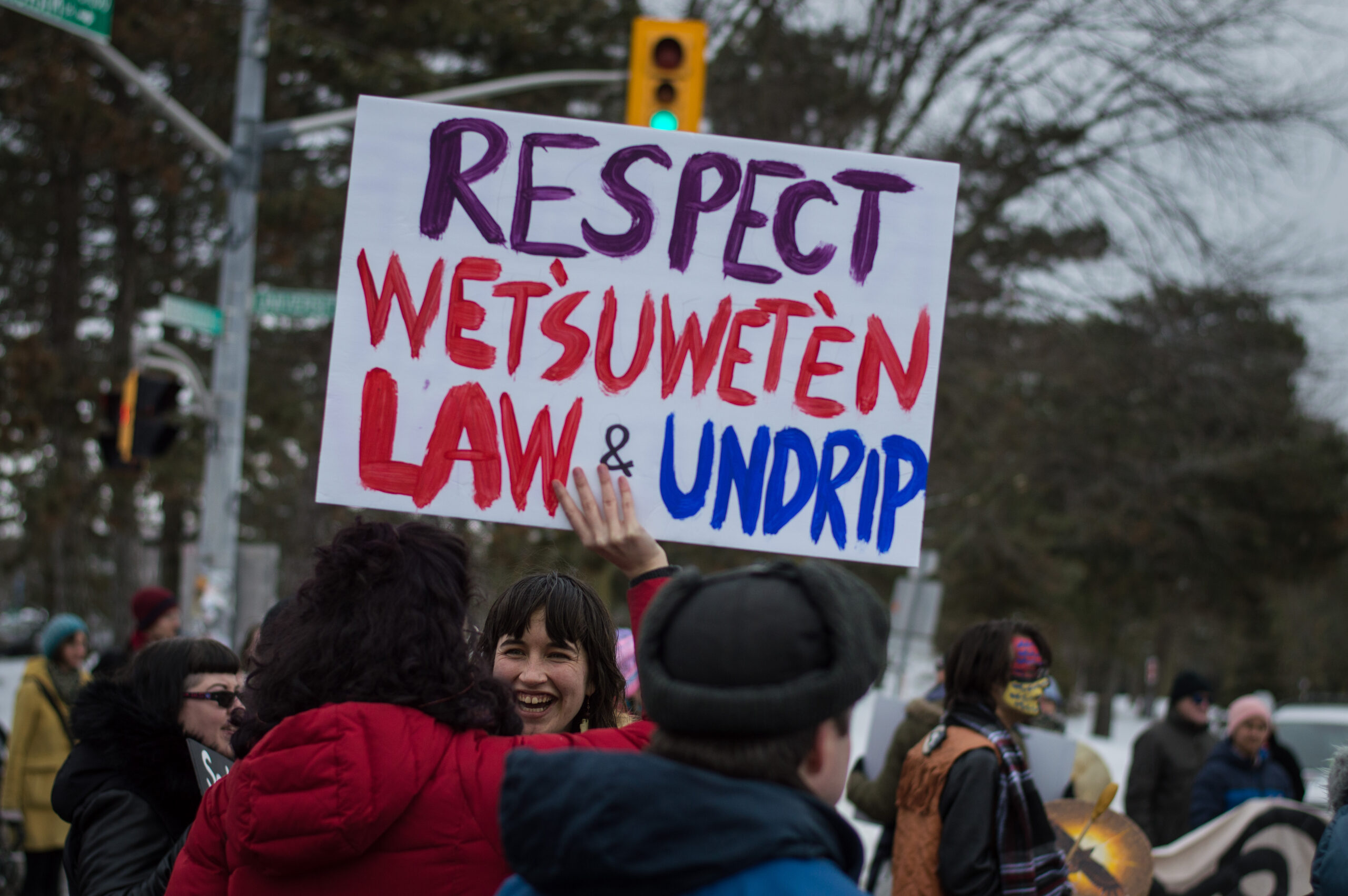
The Wet’suwet’en (wet-SO-it-en) crisis out West is confusing, constantly moving, and dominating every headline.
We know it can be really difficult to keep up with this huge development of history in the making, especially when the terms are confusing — hereditary chiefs? Aboriginal Title? — the law seems unclear — jurisdiction? Inherent rights? Rule of Law? — and the frustration of being inconvenienced by protests can cloud your understanding of right versus wrong.
We hear you, and it’s the purpose of this article to try and make it a little less confusing. We only have so much room to discuss a major and constantly moving conflict, so we encourage you to seek more resources for a more thorough understanding, such as www.unistoten.camp.
At face value, we have a privately-owned pipeline Coastal Gaslink (CGL) planned to carry liquefied natural gas through the traditional territory of the Wet’suwet’en Nation in British Columbia.
In the past couple of weeks, BC RCMP have been attempting to forcibly remove Wet’suwet’en People from their lands to make way for the pipeline development to begin.
Their traditional territory covers approximately 22,000 square kilometres of land, and that none of that land is covered by any treaty, purchase, or agreement with the Crown – it is unceded territory.
Furthermore, a Supreme Court of Canada decision in 1997 (Delgamuukw v. British Columbia) confirmed that the traditional governance of the Wet’suwet’en People is that which holds title to their lands.
The judgement found that each Wet’suwet’en Chief has rights and responsibilities specific to a particular territory over which that Chief is given a duty to protect. The rights andresponsibilities are confirmed, coordinated, and directed to the common good.
This governance system runs at the same time as Band governance, a system imposed on Indigenous Peoples throughout Canada by the Indian Act, where Chiefs and Councils are responsible for decisions on relatively small territories of land.
However, because of the Delgamuukw decision, we know that it does not legally matter in this issue whether Band Councils have signed on to the pipeline, because the land in question is not in their jurisdiction.
Furthermore, in the case of some Hereditary Chiefs being pro-pipeline (which has been reported), the traditional law of the Wet’suwet’en People states that trespassing is the worst offence one could commit.
The Hereditary Chiefs who oppose the pipeline development are opposing it on their specific territory within the larger traditional territory of the whole Wet’suwet’en Nation, as each individual Hereditary Chief is responsible for a certain area of land under their House and Clan system.
So even if other Hereditary Chiefs want the pipeline project, one house group can not authorize a project that would be on another house group’s land.
This would be an act of war under traditional Wet’suwet’en governance. It’s important to understand, too, that this direct conflict is not exactly about the pipeline itself anyway – in fact, all Hereditary Chiefs had agreed to a specific pipeline route that they were okay with for CGL to develop, but CGL denied the route for financial reasons and because it went too close to more urban areas.
The route CGL insists on developing goes through areas of major ecological and cultural importance to Wet’suwet’en People, and this is what they are saying no to. The Indigenous uprising we are seeing across the country is therefore not about the pipeline development itself – it’s about respecting Indigenous jurisdiction and legal title to traditional lands.
We can see now that this pipeline conflict is violating traditional Wet’suwet’en Rule of Law, Canadian Rule of Law, and International Rule of Law as the situation with BC RCMP forcibly removing Indigenous Peoples from their home territory and this violates multiple articles of UNDRIP, which the province of British Columbia has recently signed into law.
So… what’s going on now? Well, perhaps you’ve been experiencing some disruption in your day-to-day life, or you have seen many headlines about Canada’s railway systems being effectively shut down by protests for Wet’suwet’en.
This is part of a national movement to #ShutCanadaDown to hold Canada and British Columbia accountable for their illegal actions on unceded Wet’suwet’en territory.
The demands that must be met before protests and blockaders will dismantle their camps alongside railroads are as follows:
1) BC RCMP be immediately and completely removed from Wet’suwet’en lands and all patrols be ceased.
2) An eviction notice to CGL by the Wet’suwet’en Hereditary Chiefs on January 4, 2020 be respected, and all CGL activities be ceased on the territories.
3) Once those other two demands are met, a Nation to Nation discussion occurs between Wet’suwet’en People and the Federal Government on Wet’suwet’en territory to ensure inclusivity of the Hereditary Chiefs and the members they are accountable to.
You may wonder, as a random student who has no direct stake in this major national conflict, why you are being subject to major inconveniences in accessing public transit in the midst of the protests, or you may be frustrated at the apparent halt of the economy, or you may be stumped as to why these protests are happening nationally when the conflict is in Northern BC.
You must understand the uncomfortable truth that as you live, work, and play on these lands, you are benefitting from the ongoing colonization that shuts Indigenous Peoples out of their home territories that they have developed sacred kinship relationships with since time immemorial.
While the direct conflict exists in BC, the violation of Indigenous rights can and has existed elsewhere all over this country. By standing up for Wet’suwet’en Peoples, we are standing up for Indigenous sovereignty everywhere, and it is time for Canada to realize that reconciliation is dead, if it was ever alive in the first place. So while you experience the inconvenience of securing alternative modes of transportation, know it is nothing compared to being forcibly and illegally removed from your homelands. Canada owes everything to Indigenous Peoples, and it is time Canada starts paying that justice. #LandBack































